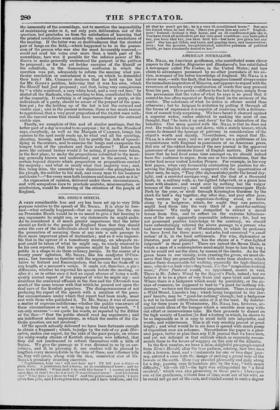MR. SHIEL'S SPEECH.
A VERY considerable hue and cry has been set up to very little purpose relative to the speech of Mr. SHIEL. It is clear he fore- saw—what actually happened—that an assemblage like the one on Penenden Heath would be in no mood to give a fair hearing to any arguments he might use, or any statements he might make. As he considered it of much greater importance that the latter should go forth to the people of England than that they should enter the ears of the individuals about to be congregated, he took the precaution of securing them at any rate a safe passage to their more important place of destination ; and as it was impossi- ble that in the uproar of a tumultuary meeting, an adequate re- port could be taken of what he might say, he wisely resolved to be his own reporter, that his opinions might be laid before the public in a shape to do them ordinary justice. In the course of a twenty years' agitation, Mr. SHIEL, like his coadjutor O'CON- NELL, has become so familiar with the arguments and topics re- lative to Ireland and Emancipation, that he can fire them off at any length, at a moment's notice. It made not, therefore, a pin's difference, whether he reported his speech before the meeting, or after it ; as in either case it had an equal chance of being a suffi- ciently correct report of the purport of what he might say : and doubtless the oratorical effusion in the Sun and the Chronicle was much of the same tenour with that which he poured out upon the deaf ears of the Kentish populace. The disingenuousness of not prefacing the report of the speech with a mention of the pecu- liar circumstances under which that report had been made, must rest with those who published it. To Mr. SHIEL it was of course a matter of supreme indifference whether the public was aware of these circumstances or not, so long as they read his speech. " I am only anxious "—we quote his words, as reported by the Editor of the Sun—" that the public should read my arguments ; arid am indifferent about imputations, in which the merits of the Ca- tholic question are not involved."
Of the speech aatually delivered we have been fortunate enough to obtain a fragment ; which, to judge. by the rule of ex pede Her- culean, makes one regret, for the sake of the poor people, on whom the wishy-washy stream of Kentish eloquence was inflicted, that they did not condescend to refresh themselves with a little of SHIEL. We give the passage as it was dictated to us by an ear- witness, and if, in perusing it, our readers will be pleased to lengthen every monosyllable to the time of three, our informer tells us, they will catch, along with the idea, somewhat also of Mr. Snxim's peculiarly drawling elocution. " Englishmen, hear me ! will you hear me ? I'll tell you a story—a plain story. A gentleman had a horse, an ill-conditioned horse ; and he says to his friend, What shall I do with this horse ? 1 cannot get flesh upon him all that! do; he is a very ill-conditioned horse.' And his friend says What have you done to him ?' And the gentleman replied, 'I have given him plil, and I have given him nitrel and I have bled him, and for
all that he won't get fat ; he is a very ill-conditioned horse." But says his friend when he had done, Have you given him any oats ?' English- men ! Ireland—Ireland is that horse, and an . ill-conditioned jade she is. You have tried all methods to get her into good condition—you have pilled her, you have bled her, you have fired her—but have you given her any oats? She has got tithes, and taxes, and gagging-laws, and insurrection- laws ; but the genuine, unsophisticated, nutritive pabulum of political health, ye have constantly denied to her."


















 Previous page
Previous page